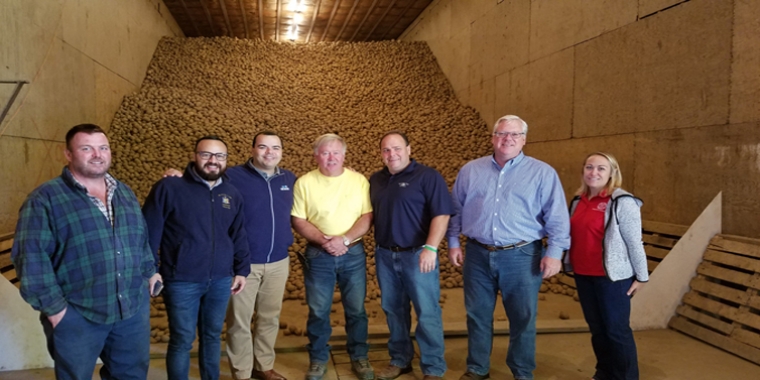O’Mara, Cornell University announce upgrade of America's only quarantine research facility for potato pest Golden Nematode ~ Enhanced facility will be top protector of nation's $3.8 billion potato sector, including Steuben County growers
October 14, 2016
-
ISSUE:
- potato industry
-
COMMITTEE:
- Environmental Conservation

Ithaca, N.Y., October 14–There’s nothing golden about the golden nematode. Currently quarantined to eight counties in New York State, including Steuben, this potato pest first discovered in New York State in 1941 is so destructive that, not controlled, it can lead to total crop failure. Additionally, the pest is so persistent in soil, living up to 30 years and almost impossible to eradicate, that if it were to spread to other parts of the country it would compromise domestic and international trade as embargoes against any agricultural commodity that comes in contact with soil (e.g. all nursery, turf, root, and tuber crops) would be put in place.
While the collaborative effort involving Cornell University, the USDA Agricultural Research Service (ARS), the USDA Animal and Plant Health Inspection Service (APHIS), and the New York State Department of Agriculture and Markets (NYSDAM) has kept the threat at bay for the past seven decades through quarantine, regulations, and developing resistant potato varieties and management plans, the recent discovery of a new race of the golden nematode threatens the continued success of the quarantine program. But $1.2 million in new funding from the State of New York to upgrade Cornell’s quarantine facility, the only one in the nation, will ensure that the Empire State’s and the nation’s potatoes are protected from the devastating pest.
"I am very grateful to work together with several of my Senate Majority colleagues to assist the College of Agriculture and Life Sciences make this critical investment in enhancing, modernizing and upgrading its Golden Nematode Quarantine facility,” said Senator Tom O'Mara, a member of the Senate Agriculture Committee. “New York State's potato growers are among the nation's leaders, including the growers I represent in Steuben County who are a mainstay of an agricultural sector that accounts for thousands of jobs and more than $70 million in annual production value. We cannot risk the survival of our potato growers because we fail to contain the Golden Nematode that is the industry's greatest threat.”
According to the Empire State Potato Growers Association, New York State's 150 growers account for a $73-million industry. Steuben County has long been one of the state's top potato producing counties. Nationally, potato production represents a $3.8-billion industry.
The detection of the pale cyst nematode, a cousin to the golden nematode, in Eastern Idaho in 2006 resulted in an immediate ban on interstate commerce of potatoes and other agricultural crops shipped in or contaminated with soil at harvest from the infected areas. Canada, Mexico, South Korea, and Japan stopped importing potatoes from Idaho for a period of time, with Japan still banning potatoes from the state as of 2016. The work of the partnership research program between Cornell and USDA ARS is to prevent such an occurrence from happening in New York State.
“I applaud Senator O’Mara and all of the state senators who recognize the importance of the golden nematode quarantine facility and thank them for their invaluable support,” said Kathryn J. Boor, the Ronald P. Lynch Dean of the College of Agriculture and Life Sciences. “In addition to supporting our extension efforts in helping New York farmers prosper, this facility also illustrates federal, state and university cooperation, all working together to protect the nation’s produce and economic viability.”
To control the pest, Cornell breeders have developed 22 nematode-resistant potato varieties. The first, Peconic, was released in 1966; the most recent, Waneta and Lamoka, in 2011. Walter De Jong, associate professor of plant breeding and genetics, in collaboration with USDA molecular biologist Xiaohong Wang, also a courtesy associate professor of plant pathology and plant-microbe biology, conducts the potato breeding research. Additionally, Wang runs the quarantine facility and an ARS-funded research program which works to understand the biology of the nematode and to develop novel nematode control strategies.
The golden nematode also attacks tomatoes and other plants related to the potato, including eggplant. The 2015 valuation of U.S. tomato production was $2.7 billion, according to the USDA.
O’Mara added, “Cornell University's efforts over the past 70 years to contain the organism, and to conduct the research and development that will always be the front line of protection for our growers and growers throughout America, have been remarkable. This upgraded facility will ensure that Cornell's enormously important work on behalf of one of New York's key agricultural industries will be carried on effectively and successfully."
O’Mara also noted that he worked in partnership with State Senate Majority Leader John Flanagan (R,C,I-Smithtown) and Senators Ken LaValle (R-Mount Sinai), Betty Little (R,C,I-Glens Falls), Mike Nozzolio (R,C,IP-Seneca Falls) and Catharine Young (R,C,I-57th District) to secure the state funding to assist the first phase of the facility's renovation.
Share this Article or Press Release
Newsroom
Go to NewsroomO'Mara will continue offices in Elmira, Bath, and Albany
January 3, 2023


O'Mara votes 'No' on legislative pay raise
December 22, 2022

